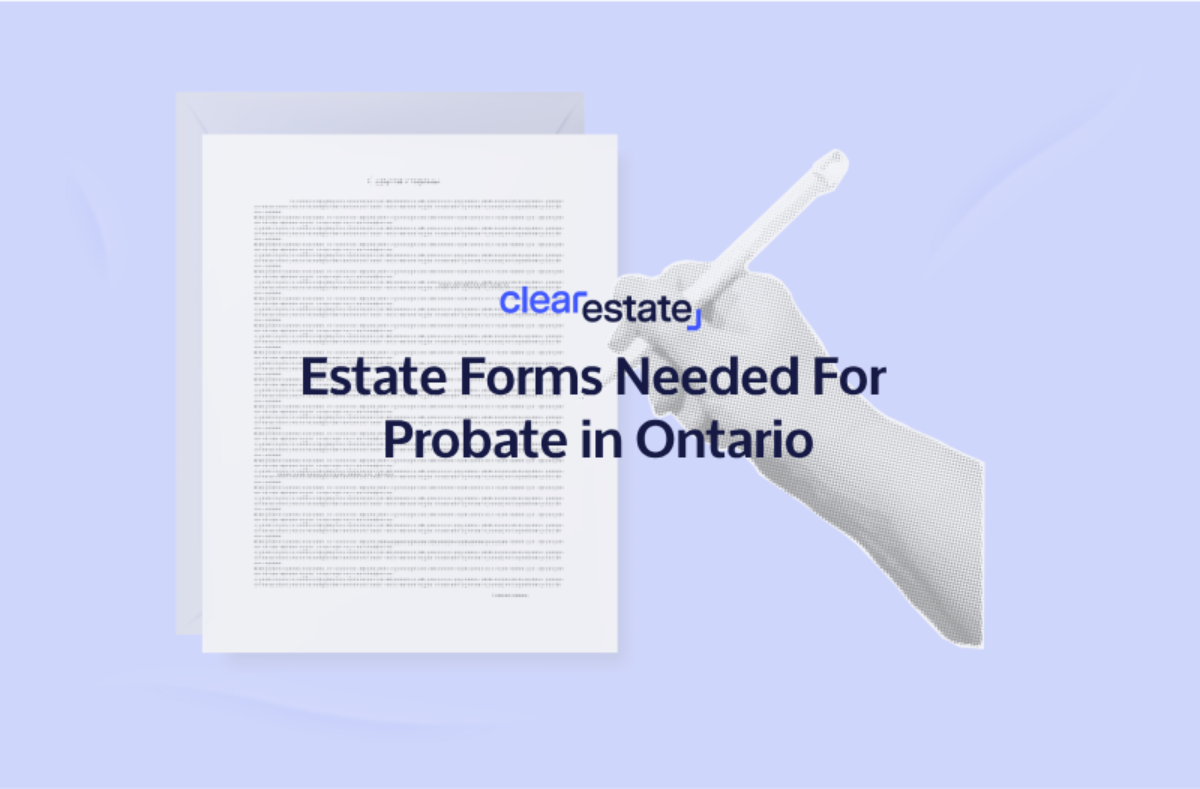Estate Settlement
Dec 04, 2024
How Do Executors Mail Inheritance Checks?
Find out how inheritance checks are mailed, including security measures and what to do if there are delays in receiving them.
This guide provides clear guidance on the probate estate forms required by Ontario in 2024 for intestate and testate estates.


Article Contents
Since 2022, Ontario has made significant changes to its estate probate forms, streamlining the paperwork process for executors and personal representatives alike.
Despite these improvements, navigating probate can still be complex, as the specific forms required can vary depending on the unique circumstances of each case.
This blog post helps you understand which forms you need, compiled by our lists of experts who submit hundreds of probate applications a month for our clients.
To apply for probate, you will need the following forms:
If the deceased had a holographic will, the executor requires:
In addition to form 74a and 74b the following forms will be needed if the deceased passed away without a will:
Form 74G Part 2 - Consent to Appointment of Estate Trustee or to an Order Dispensing with/Reducing Bond: A legal document used by adult beneficiaries (18 years or older) who are entitled to share in the estate distribution. It serves two primary purposes:
If a bond is needed you will need either of these forms:
Bonds serve as an essential security measure under various circumstances, ensuring the responsible management and protection of the estate's assets. These situations typically include:
If an executor does not feel they can carry on their duties of being an estate trustee, or if the named executor of the will wants to hand off their fiduciary duty, they would need:
Form 74G Part 1 (Renunciation) is mandatory when there are individuals who are entitled to be appointed as estate trustees but have chosen not to apply for the role themselves. This includes:
Form 74J - Application for Certificate or Confirmation of Appointment
This all-in-one form is used for various estate administration scenario for foreign executors, resealing probate, and succeeding trustees. It's divided into 8 parts:
1. Deceased's information (used in all cases)
2. Succeeding Estate Trustee applications
3. Foreign Estate Trustee's Nominee applications (without a Will)
4. Resealing or Ancillary Appointment applications (with a Will)
5. Estate asset values
6. Applicant's entitlement to apply
7. Estate Administration Tax (for foreign, resealing, ancillary cases)
8. Bond requirements
Applicants complete only the relevant parts based on their specific situation.
There are two methods to submit your probate application:
Electronic Filing Process:
To file probate documents electronically, follow these steps:
If you prefer to file physically:
Submit your application package to the Superior Court of Justice in the county or district where the deceased last resided. For those who weren't Ontario residents, file where they owned property within the province.
Dealing with probate forms in Ontario can be complex, whether you're handling a standard estate, a small estate under $150,000, or dealing with foreign assets. From Form 74A for initiating the probate process to specialized forms for holographic wills or estate trustees, each situation requires careful attention to detail.
Don't let the paperwork overwhelm you. Our team of experts handles hundreds of probate applications every month, ensuring accuracy and efficiency in every step of the process.
Ready to simplify your probate journey?
Book a Free Consultation Today
Our estate professionals will:
Save time, reduce stress, and ensure your probate application is done right the first time.
 Simplify Probate Today
Simplify Probate Today
Get expert guidance from our probate specialists who've helped 10,000+ families.
Book a free consultation today